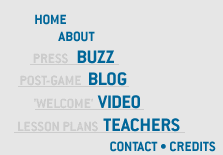LESSON SIX:
Food Without Oil
Introduction
In a crisis, we can live without many things, but food is not one of them. The impact on our food supply is one of the most serious aspects of the oil crisis. Most of the big chain grocery stores are filled with foodstuffs grown in a very oil-intensive way, as well as products trucked and shipped from around the world. Food shortages, plus sharp increases in production and transportation costs for food, have forced many people to look to locally produced food or to attempt to grow their own.
As you present developments in the oil crisis, ask the students to talk realistically about the effects in their own lives, as if the oil crisis were really happening. As they try to anticipate what will happen next in the crisis, they will naturally explore the role that resources have in their lives.
Lesson Objectives
Students will:
-
Continue to immerse themselves in the realistic WWO scenario.
-
Estimate the distance that food travels to their community.
-
Understand the the concept of food miles and the connection that food consumption has to oil consumption and global warming.
-
Identify local sources of food.
-
Develop a food sustainability plan to ensure that food supplies last through the winter months.
- Continue to develop personal strategies predicated upon anticipated events.
- Continue to reflect on the life changes that would occur in a prolonged oil shortage.
Before the Lesson
- Bring in five food items not grown or produced in your immediate area. Example: fresh bananas, canned pineapple, canned tuna, a box of cookies, etc. Make sure you know the city or country of origin for each of these products. Determine the approximate distance the item had to go in order to get to your local market. You can use the Virtual GPA web site: http://www.zenithair.com/misc/distance.html
- Prepare your own "in-game" reaction to the events unfolding in World Without
Oil.How vulnerable are you personally to disruptions in the food supply? If you can, blog your in-game reaction and share your blog with your students.
Part 1: Set the Stage
Student Page for this lesson is here:
http://worldwithoutoil.org/metalesson6s.htm
This page summarizes ideas and instructions for students.
- Re-immerse the students: briefly remind them of what's happened previously in a World Without Oil.
- Watch Kal's "Grocery shopping without oil" video http://www.youtube.com/watch?v=19R3Ae7EhPw
- Read Cid Yama's "A grocery nightmare"
http://wayback.archive-it.org/690/20070522050054/
http://cid-yama.livejournal.com/1138.html
Part 2: Take Action
-
In groups, have students list the food items that will probably be the first to disappear from their local grocery store or would become too expensive to purchase. Are these items necessities? Can they be replaced with other goods?
- Have the groups share their responses. Record them on the board or computer for later use.
Part 3: Lesson Activity
- Present the five food products you pre-selected for this lesson and give their origins.
-
Have students guess the approximate distance each food item has traveled.
- Share with students the concept of food miles. To illustrate the distance certain foods travel to Chicago, show the How Far Does Your Food Travel? chart: http://www.leopold.iastate.edu/pubs/staff/ppp/
produce_chart.html
- With the decreasing availability of some products and the increase in cost for others, many people are looking at relocalization – the idea of bringing sustainability back to the local community. Have student groups review the following resources and then develop an individual and a community plan to make it through the winter months.
- Have the groups present their plans.
- Return to the list developed in during the Taking Action portion of the lesson. Did their solutions meet the shortfalls detailed?
Part 4: Reflect
Without proper planning, food shortages pose a significant problem in a World Without Oil. In this reflection the students should consider the following questions:
-
How has the oil crisis limited the supply of food in your community?
-
What is the long term prognosis for food production in your region? Are you concerned?
-
What solutions do you want to implement to counter the problems currently being faced in the oil crisis?
Part 5: Take It Further
Distribute this to your students:
Over the last 100 years, our food network has experienced delocalization. Most people no longer rely upon their immediate area for most of their food. To take it further today, your challenge is to find that local food.
This WWO mission asks you to find a farmer, visit your local farmer's market, or pick something from your own garden. Take pictures or video of the whole experience (including cooking and eating it!), and then post it on your blog. Good luck and enjoy that fresh local produce.
http://community.livejournal.com/worldwithoutoil/15985.html
Additional Resources
National Standards (McREL)
Overarching (All Lessons)
Standard 44.
Understands the search for community, stability, and peace in an interdependent world
Level IV (Grades 9-12), Benchmark 2:
Understands rates of economic development and the emergence of different economic systems around the globe (e.g., systems of economic management in communist and capitalist countries, as well as the global impact of multinational corporations; the impact of black markets, speculation, and trade in illegal products on national and global markets; patterns of inward, outward, and internal migration in the Middle East and North Africa, types of jobs involved, and the impact of the patterns upon national economies; the rapid economic development of East Asian countries in the late 20th century, and the relatively slow development of Sub-Saharan African countries)
Lesson 6: Specific Standards
Geography
Standard 5: Understands the concept of regions
Level IV, Benchmark 3: Understands connections within and among the parts of a regional system (e.g., links involving neighborhoods within a city, municipalities within a metropolitan area, or power blocs within a defense or economic alliance)
Standard 11: Understands the patterns and networks of economic interdependence on Earth's surface
Level IV, Benchmark 3: Understands the relationships between various settlement patterns, their associated economic activities, and the relative land values (e.g., land values and prominent urban features, the zoned uses of land and the value of that land, economic factors and location of particular types of industries and businesses)
Standard 16: Understands the changes that occur in the meaning, use, distribution and importance of resources
Level IV, Benchmark 2: Understands programs and positions related to the use of resources on a local to global scale (e.g., community regulations for water usage during drought periods; local recycling programs for glass, metal, plastic, and paper products; different points of view regarding uses of the Malaysian rain forests)
Standard 18: Understands global development and environmental issues
Level IV, Benchmark 1: Understands the concept of sustainable development and its effects in a variety of situations (e.g., toward cutting the rain forests in Indonesia in response to a demand for lumber in foreign markets, or mining the rutile sands along the coast of eastern Australia near the Great Barrier Reef)
United States History
Standard 16: Understands how the rise of corporations, heavy industry, and mechanized farming transformed American society
Level IV, Benchmark 3: Understands influences on economic conditions in various regions of the country (e.g., effects of the federal government's land, water and Indian policy; the extension of railroad lines, increased agricultural productivity and improved transportation facilities on commodity prices; grievances and solutions of farm organizations; the crop lien system in the South, transportation and storage costs for farmers, and the price of staples)
State Standards (All Lessons)
![]()
![]()
![]()
![]()
![]()
![]()
![]()
![]()
![]()
![]()
![]()






